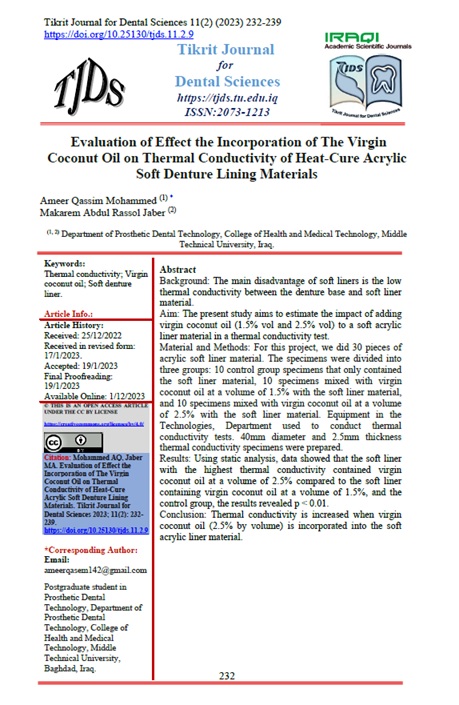Evaluation of Effect the Incorporation of The Virgin Coconut Oil on Thermal Conductivity of Heat-Cure Acrylic Soft Denture Lining Materials
Ameer Qassim Mohammed
Department of Prosthetic Dental Technology, College of Health and Medical Technology, Middle Technical University, Iraq.
Makarem Abdul Rassol Jaber
Department of Prosthetic Dental Technology, College of Health and Medical Technology, Middle Technical University, Iraq.
DOI: https://doi.org/10.25130/tjds.11.2.9
Keywords: Thermal conductivity, Virgin coconut oil, Soft denture liner
Abstract
Background: The main disadvantage of soft liners is the low thermal conductivity between the denture base and soft liner material.
Aim: The present study aims to estimate the impact of adding virgin coconut oil (1.5% vol and 2.5% vol) to a soft acrylic liner material in a thermal conductivity test.
Material and Methods: For this project, we did 30 pieces of acrylic soft liner material. The specimens were divided into three groups: 10 control group specimens that only contained the soft liner material, 10 specimens mixed with virgin coconut oil at a volume of 1.5% with the soft liner material, and 10 specimens mixed with virgin coconut oil at a volume of 2.5% with the soft liner material. Equipment in the Technologies, Department used to conduct thermal conductivity tests. 40mm diameter and 2.5mm thickness thermal conductivity specimens were prepared.
Results: Using static analysis, data showed that the soft liner with the highest thermal conductivity contained virgin coconut oil at a volume of 2.5% compared to the soft liner containing virgin coconut oil at a volume of 1.5%, and the control group, the results revealed p < 0.01.
Conclusion: Thermal conductivity is increased when virgin coconut oil (2.5% by volume) is incorporated into the soft acrylic liner material.




